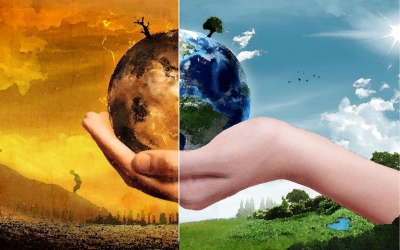
Flash floods, storms, heatwaves, and drought… Extreme weather events are rocking the world, and are likely to leave you feeling anxious. Recent studies have shown that climate anxiety is for real. Here’s what you can do.
Madhuvanti S. Krishnan.
Climate change and eco-crisis are well known. But what is climate anxiety? No, it isn’t a figment of your imagination, and yes, it does exist. finds recent research. In September 2021, a survey was conducted across 10 countries, led by the University of Bath, in collaboration with five universities, and funded by Avaaz, a campaign and research group. It involved 10,000 people between the ages of 16 and 25 years, and discovered that more than half of them experienced climate anxiety. and thought that humanity was doomed, courtesy, climate change
So, what is climate anxiety? Brit Wray, a Stanford researcher and author, Generation Dread says. “Climate anxiety is an assortment of feelings that a person can experience when they wake up to the full extent of the climate and wider ecological crisis.”
She further explains that as the term implies, anxiety is one aspect of it, but there are other emotions that occur alongside. For instance, she elaborates, grief, fury, helplessness, hopelessness, and difficult feelings along similar lines, that point out people’s concern for the world. Succinctly put, it is a feeling of guilt or desperation, a sense of doom, about the state of the environment.
It has been attracting progressively more attention among climate and social scientists, especially due to its impact on people’s mental health.
Drivers
Constant media exposure, the tendency to incessantly access and consume content on social media, multiple studies that show species being threatened or becoming extinct, relentless news on coral reefs dying, melting glaciers, and more, heightens anxiety.
Then, there’s Nature, which plays an instrumental role in simultaneously exacerbating and keeping at bay climate anxiety. Events such as natural disasters, resource depletion among others, drive anxiety as people who are aware of the value of nature will be more sensitised to the risk of loss relates to climate change. However, the flip side to this is that it is only when they are exposed to Nature. will they be healed of such anxiety -research details how engaging with the great outdoors and actively involving oneself in environment-related activities will reduce the rising feeling of alarm one experiences.
Maximum impact
In 2020, Friends of the Earth, an environmental non-profit organisation, estimated that over two-thirds of people, between 18 to 24 years, experience climate anxiety. Indeed, as youngsters who will bear witness to the worsening after-effects of climate chaos, it is unsurprising that it is primarily they who are most anxious and concerned. In fact, Gen Z has been nicknamed the Climate Generation.
Does this mean others are unaffected?
Not really. While the older generations are undoubtedly disquieted about the crisis, they are more perturbed by the short-term impact of climate change. In other words, their consternation will not take a toll on their mental health and overwhelm them as much as it does Gen Z
There are digital tools that help combat eco-anxiety, and an interactive website, Hold This Space, does precisely this. Designed in collaboration with psychologists and environmental scientists, it conducts activities that target people experiencing anxiety. especially youngsters, and encourages them to channelise their feelings into effective climate action, which by extension, helps them develop resilience and coping mechanisms.
SOME TIPS
*It is normal to experience climate anxiety because you are constantly exposed to climate-related news.
*You are not alone. Do not let anxiety overwhelm you. *Talk about your feelings, make yourself heard.
*Connect with like-minded people who will understand where you come from, without brushing off your anxiety as
*Get involved in activities to do with nature that will not only lessen your anxiety by virtue of being actively involved, but will also help you develop skills and build resilience.
Picture Credit :Google




